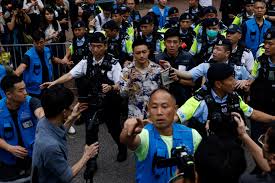HONG KONG: Fourteen pro-democracy activists were convicted in Hong Kong’s biggest national security case on Thursday by a court that said their plan to effect change through an unofficial primary election would have undermined the government’s authority and created a constitutional crisis.
After a 2019 protest movement that filled the city’s streets with demonstrators, authorities have all but silenced dissent in Hong Kong through reduced public choice in elections, crackdowns on media and the Beijing-imposed security law under which the activists were convicted.
Those found guilty of conspiracy to commit subversion included former lawmakers Leung Kwok-hung, Lam Cheuk-ting, Helena Wong and Raymond Chan, and they could face up to life in prison when sentenced later. The two defendants acquitted were former district councillors Lee Yue-shun and Lawrence Lau. But the prosecution said it intends to appeal against the acquittals.
The activists were among 47 democracy advocates who were prosecuted in 2021 for their involvement in the primary. Prosecutors had accused them of attempting to paralyze Hong Kong’s government and topple the city’s leader by securing the legislative majority necessary to indiscriminately veto budgets.
In a summary of the verdict distributed to media, the court said the election participants had declared they would “either actively use or use the power conferred on the (Legislative Council) by the (Basic Law) to veto the budgets.” Under the Basic Law, the chief executive can dissolve the legislature if a budget cannot be passed but the leader would have to step down if the budget is again vetoed in the newly-formed legislature.
In the full, 319-page verdict, the court also said if the plan to veto bills would lead to the dissolution of the legislature, it meant “the implementation of any new government policies would be seriously hampered and essentially put to a halt.”
“The power and authority of both the Government and the Chief Executive would be greatly undermined,” the court said in the verdict. “In our view … that would create a constitutional crisis for Hong Kong.”
The judges concluded that “unlawful means” are not limited only to criminal acts, and that it was not necessary for the prosecution to prove the accused knew that the means to be used were “unlawful.”
Lau, who was acquitted, told reporters that he should not be the focus at the moment as other defendants in the case warrant the public’s concern and love. He said if there’s any “star” in the case, the judgment should be “the star” because it set out the logic and perspectives of the judges. “This is part of our rule of law,” he said.


